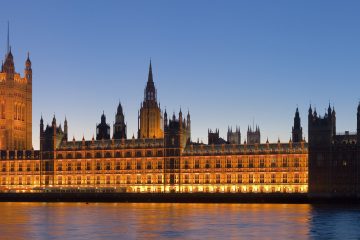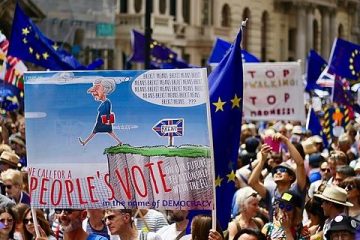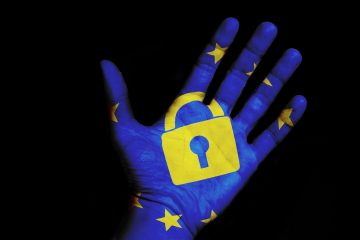
Why Brexit Won’t Change Sinn Féin’s Abstention from the UK Parliament
Irish Republican abstentionism from the British Parliament has a long and complicated history. Arguably, the last few decades since the Good Friday Agreement have been some of the least consequential or controversial since the practise began. The 2017 election, the DUP’s entry into a confidence & supply agreement with the Conservative Party, and the backdrop of a Parliament unable to act upon the result of the Brexit referendum, has renewed interest in it. Sinn Féin’s decision not to take their seven seats in Westminster is causing consternation, particularly from those who wish to see the party enter Parliament and derail a no-deal or ‘hard’ Brexit. While debating the merits of abstentionism is an argument as old as the practise itself, …

Lacking Substance: Drugs and the Tory Leadership Contest
Revelations about Michael Gove’s past cocaine use have redefined the Tory leadership contest. Despite the ongoing Brexit process, growing economic uncertainty, and the Conservative’s historic defeat in the recent European elections, the debate has been dominated by illegal drug use. Seven of the ten candidates have admitted taking cannabis, cocaine, and even opium – though frontrunner Boris Johnson has stayed conspicuously quiet in the light of past statements. Even Theresa May has faced questions about her history with drugs. The problem is not that politicians are talking about drugs, but what they are talking about. Drugs are an important issue, and any future Prime Minister should have a thought-out, evidence-based and proactive stance on drugs – including on issues like …

London and the rest: regional transport disparities in the UK
Crossrail, still trumpeted as the largest construction project in Europe, and once held up as a paragon of a well-run, on-time and on-budget development, is now late and seriously over budget. Praise has been replaced by political infighting as the blame game gets into full swing and warnings that this will further imperil Transport for London’s (TFL) already shaky looking finances. However, hidden beneath the debris of mismanagement is something much worse: the willingness of the British government to plough vast sums into transport in London, whilst simultaneously underfunding transport in the rest of the country. Across the UK public transport has been de-regulated and privatised under policies originating in the 1980s, yet, London is a treated as a special …

Brexit has accelerated, not caused, government’s weakening power over parliament
In Britain, the government dominates parliament. This claim is a staple of “textbook” descriptions of British politics. Academic literature also suggests the British government’s power over parliament is unusual in international terms. As a result, the government’s struggle to secure parliament’s support for its Brexit deal has been widely seen as evidence that Brexit has challenged – or even overturned – this conventional wisdom. However, in this blog post we argue that recent events can be better understood as an acceleration of pre-existing trends in Britain’s political institutions and political parties that have weakened government’s grip over parliament. The Brexit process may have challenged the government’s ability to control parliament, but it was pushing at an open door. Three institutional …

Brexit and a “People’s Vote” – what would Wittgenstein do?
Calls for a second referendum on EU membership have been growing louder without, however, properly making the case for it. They fail to address the heart of the matter: how to show adequate respect for the democratic result of the 2016 referendum on EU membership whilst making the case for a new referendum. Ultimately, the case for a second referendum requires a compelling justification for challenging the first. The real question that the proponents of a people’s vote must confront is whether the democratic process can be suspended without undermining its legitimacy. They need to be able to square the circle, because a democracy worth the name depends on the consistent application of its rules. The risk of violating consistency …

How did Voting on the Brexit Referendum Affect Voting on May’s Brexit Deal?
On January 15, 2019, Prime Minister Theresa May’s Brexit deal suffered a defeat of historic proportion in the House of Commons: 432 MPs voted against and 202 for the ‘EU Withdrawal Act’, with a staggering margin of 230 votes. But how do the MP positions on May’s deal compare with the constituency-level votes on the 2016 referendum? [i] Notably, almost all the intra-party variation in voting takes place on the Tories’ side of the aisle. Only 3 Labour MPs bucked the party line and voted for the deal, whereas 118 Tories voted against May’s proposal. The plot below shows the distribution of constituency vote on the Brexit referendum by MPs voting either for or against the Brexit deal. The graph …

Our Day Will Come: The Inevitability of Irish Unification as Brexit Approaches
On June 23rd, 2016, the citizens of the UK voted to leave the European Union. This began an unprecedented process of dissociation, commonly known as Brexit. Among the many challenges that Brexit poses is how to handle the border between Britain and the Republic of Ireland. In the recent past, the “soft” border between the two nations has allowed for the free flow of people and goods. However, if Brexit negotiations fail, a “hard” border will replace the currently soft border between the Republic and Northern Ireland. This presents a problem because under present conditions the border allows for mutually beneficial economic and social exchange, as well as having been instrumental in guaranteeing the Northern Irish peace process. This border …

Be vigilant of the UK government’s attempts to increase its surveillance powers
Cybersecurity has become a major concern for governments, companies and citizens, as some of their most sensitive information is routinely stored and communicated online. Rogue attackers can steal confidential information or corrupt their databases, potentially leading to critical security incidents ranging from reputational damages and economic losses to national security risks. The threat, however, works in two ways. While companies and governments are concerned about being targets of digital infiltration, they have used these technologies to obtain extensive information from common citizens for crime and terrorism prevention or commercial purposes. Collecting geolocationdata and screening social networks are now common practices, relatively easy to carry out due to the embedded features of modern devices. For years, many surveillance practices were conducted …









